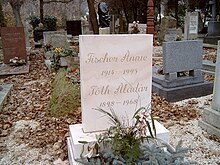Annie Fischer
Annie Fischer (born July 5, 1914 in Budapest , Austria-Hungary ; died April 10, 1995 in Budapest) was a Hungarian pianist who escaped the Holocaust by fleeing to Sweden and is best known for her Beethoven interpretations.
Life
Fischer studied at the Franz Liszt Music Academy in Budapest with Ernő Dohnányi . In Arnold Székely's piano class there were also Georg Solti (at that time still György Stern), Edith Farnadi and György Fejér .
At Christmas 1926 she played in a concert by young musicians in which the young Solti was also allowed to conduct. There the 28-year-old music critic Aladár Tóth heard them . In 1927 she began touring abroad as a pianist. In 1930 she was in Paris for the first time and a year later in Rome . In 1933 she won first prize at the Liszt Competition in Budapest ("Liszt Ferenc Zongoraverseny") with the piano sonata in B minor by Franz Liszt , one of the jurors was the seventy-year-old Liszt student Emil von Sauer . Another Székely student Louis Kentner received a third prize, and the exiled Russian Anatole Kitain was one of the prize winners.
In 1936 Fischer and Aladár Tóth married, who was a musicologist and worked as a music critic for the newspaper Pesti Napló and the literary magazine Nyugat . After the anti-Semitic ban on Jews from performing in Hungary in 1939, she played Beethoven's 5th piano concerto and works by Johann Sebastian Bach for the Jewish cultural organization OMIKE in the Goldmark Hall . In 1940 she and her husband were able to flee to Sweden and thus avoided further persecution and the Holocaust of the Hungarian Jews by the Eichmann commando and its Hungarian helpers.
In Sweden she gave piano lessons for a while. In 1946 they both returned to Budapest, Tóth was director of the Budapest Opera from 1946 to 1956 and brought Otto Klemperer as musical director from 1947 to 1950. Fischer made recordings with Klemperer, who, like Swjatoslaw Richter , greatly admired them (“you are too chaste”), in Budapest and later in London, including Liszt's 1st Piano Concerto .
Fischer also went on concert tours to western countries. She received the Kossuth Prize in 1949, 1955 and 1965 and became an honorary professor at the Academy of Music. In 1974 she received the Hungarian version of the Order of the Red Banner of Labor and in 1994 the Order of Merit of the Republic of Hungary .
Her recording of the 32 Beethoven sonatas was not approved by her because she was not satisfied with it. The recordings were only published posthumously .
The Hungarian Ministry of Culture donated an Annie Fischer scholarship, with which ten young professionals are to be supported.

literature
- András Schiff , Tamás Vasary : Annie Fischer . Klassikus és Jazz Kiadó, Budapest 2002, ISBN 963-8615-71-0 .
- Cord Garben: Past luck ... the art and fate of legendary pianists. Wilhelmshaven 2018, 2nd edition. Pp. 243-266. ISBN 978-3-7959-1013-6 .
- Tamás Vasary: Memories of Annie Fischer . In: The Hungarian Quarterly , Vol. 36 (1995), ISSN 1217-2545 .
Web links
- Un-Official Website: Annie Fischer Legendary Pianist (with Biography, Discography, Concertography and Rare Photos) created and managed by Yuan Huang, Dec. 2014
- Interpretations by Annie Fischer in the catalog of the German National Library
- Niel Immelman , Annie Fischer , The Independent obituary , April 20, 1995
Individual evidence
- ↑ János Breuer, "The Early Years of Sir Georg Solti" hungarianquarterly ( memento of the original from June 26, 2008 in the Internet Archive ) Info: The archive link was inserted automatically and has not yet been checked. Please check the original and archive link according to the instructions and then remove this notice.
- ↑ Aladár Tóth (February 4, 1898, Székesfehérvár - October 18, 1968, Budapest)
- ↑ Vera Héri; Ágnes Makkai: Kereszt, érem, csillag - Kitüntetések a magyar történelemben . Helikon kiadó, 2002, ISBN 9789632087580 (accessed May 9, 2010).
| personal data | |
|---|---|
| SURNAME | Fischer, Annie |
| BRIEF DESCRIPTION | Hungarian pianist |
| DATE OF BIRTH | July 5, 1914 |
| PLACE OF BIRTH | Budapest |
| DATE OF DEATH | April 10, 1995 |
| Place of death | Budapest |
